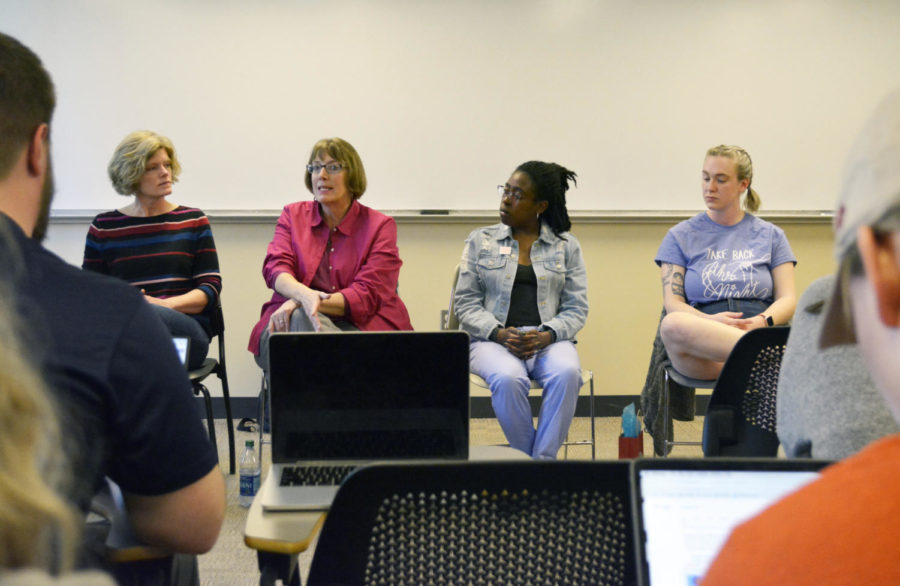‘Why I wear denim’ panel highlights necessary nuance in sexual violence reporting
Katlyn Campbell/Iowa State Daily
“Why I Wear Denim: Shifting the Stigma”, a panel on how media shapes and adapts the message of sexual violence, (left to right) consisted of Julie Roosa, First Amendment Specialist, Kathie Obradovich, opinion editor at the Des Moines Register, Jazzmine Brooks, Violence Prevention and Green Dot Coordinator and Tricia Ingram Williams, ACCESS Campus Advocate. Panelists discussed their opinions on the topic of addressing sexual violence from a media standpoint on Monday, April 8 at Hamilton Hall. This event was a collaboration between the Iowa State Daily, ISU Green Dot and the Greenlee School of Journalism and Communication as a part of First Amendment Days 2019.
April 8, 2019
The “Why I Wear Denim: Shifting the Stigma,” panel kicked off Iowa State’s 17th annual First Amendment Days on Monday in Hamilton Hall.
The four panelists were Jazzmine Brooks, violence prevention and Green Dot coordinator at Iowa State; Tricia Ingram Williams, ACCESS campus sexual assault advocate; Kathie Obradovich, opinion editor at the Des Moines Register and lecturer at Greenlee School of Journalism; and Julie Roosa, First Amendment specialist, Greenlee School of Journalism and Communication professor and former coordinator of the Story County Sexual Assault Response Team.
Each panelist used their individual expertise to discuss how modern media influences the stigma surrounding sexual violence.
Alex Connor, senior in journalism and mass communication and editor-in-chief of the Iowa State Daily, moderated this panel by asking questions to spark the conversation about how sexual violence is and should be covered in the news.
“I think that our discussions in journalism about sexual abuse and sexual assault and sexual violence have evolved over the years, but they have become no less complicated,” Obradovich said.
When asked what role they see the media playing when it comes to addressing sexual violence, the panelists discussed how the media plays a vital role in helping society understand issues related to sexual violence, but it is a fine line to walk.
Obradovich told the audience about the first time she remembers sexual violence being explained in the news: Jane Schorer Meisner, a reporter for the Des Moines Register, was awarded a Pulitzer Prize in 1991 for her five-part series about a rape survivor. She said this narrative was extremely shocking to people because it was not something often talked about.
“For this woman to come forward and tell her story was just revolutionary, really,” Obravich said.
Brooks also discussed complications that are tied to covering sexual violence in the media.
“Just working in this field, I see how media communications impact the way we do our job in ways that are harmful,” Brooks said. “It’s harmful to the person of course being accused… and we also create substantial harm to the person who is trying to suggest support from their community.
“We are normalizing the people who are supposed to be victims and normalizing the people who are supposed to be perpetrators.”
This is just a glimpse of the difficulties that come along with reporting cases of sexual violence.
“I work with survivors here on campus and there have definitely been times where things have been reported in graphic detail without their permission and it’s been super triggering for people that I work with,” Williams said. “There is a definite responsibility and nuance when it comes to reporting cases of sexual violence.”
Reporters can combat this by writing sexual violence stories with a critical lens, and keep in mind the purpose behind the story, Williams said.
Panelists discussed how ever since the #MeToo movement began, there has been a lot more willingness for victims to come forward with instances of sexual assault, but there may not be as much nuance as there should be when reporting the instances.
Roosa went off of this statement by stressing the importance of “responsible reporting.” Verification is a critical factor when looking at what turns information into journalism, and verification for sexual violence stories are especially critical.
The #MeToo movement was something that was brought up often within the panel. Williams explained that the movement is positive and empowering, but claims that a limited amount of stories are heard. It puts a lot of emphasis on the “perfect survivor,” which there is no such thing as, she said.
Roosa continued on the positive aspects of #MeToo by stating that the chance to share their story gives the survivor the opportunity to regain their power in the situation.
When reporting such personal stories of sexual violence, it is important to understand that there is a “dark side” to the exposure. Obradovich discussed how exposure alone cannot lessen stigma around the story.
“There has got to be exposure with education,” Obradovich said.“Education about why we don’t blame and shame victims. Education about why we don’t talk about what the victim was wearing when she or he was attacked, we don’t talk about whether that victim had done something to make himself or herself more vulnerable, at least not in a way that either we start putting responsibility on the victim.”
Overall, the panelists want members of the Iowa State community to know that there are resources, both for sexual violence and proper exposure of it.
Tricia Williams, Iowa State’s campus prevention and outreach advocate for ACCESS, stressed the importance of speaking up and seeking help if and when you find the situation is right.
The ACCESS crisis line is 515-292-5378.
















